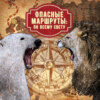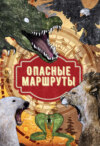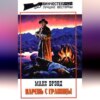Kitabı oxu: «Ronicky Doone»
Chapter One
A Horse in Need
He came into the town as a solid, swiftly moving dust cloud. The wind from behind had kept the dust moving forward at a pace just equal to the gallop of his horse. Not until he had brought his mount to a halt in front of the hotel and swung down to the ground did either he or his horse become distinctly visible. Then it was seen that the animal was in the last stages of exhaustion, with dull eyes and hanging head and forelegs braced widely apart, while the sweat dripped steadily from his flanks into the white dust on the street. Plainly he had been pushed to the last limit of his strength.
The rider was almost as far spent as his mount, for he went up the steps of the hotel with his shoulders sagging with weariness, a wide-shouldered, gaunt-ribbed man. Thick layers of dust had turned his red kerchief and his blue shirt to a common gray. Dust, too, made a mask of his face, and through that mask the eyes peered out, surrounded by pink skin. Even at its best the long, solemn face could never have been called handsome. But, on this particular day, he seemed a haunted man, or one fleeing from an inescapable danger.
The two loungers at the door of the hotel instinctively stepped aside and made room for him to pass, but apparently he had no desire to enter the building. Suddenly he became doubly imposing, as he stood on the veranda and stared up and down at the idlers. Certainly his throat must be thick and hot with dust, but an overmastering purpose made him oblivious of thirst.
"Gents," he said huskily, while a gust of wind fanned a cloud of dust from his clothes, "is there anybody in this town can gimme a hoss to get to Stillwater, inside three hours' riding?"
He waited a moment, his hungry eyes traveling eagerly from face to face. Naturally the oldest man spoke first, since this was a matter of life and death.
"Any hoss in town can get you there in that time, if you know the short way across the mountain."
"How do you take it? That's the way for me."
But the old fellow shook his head and smiled in pity. "Not if you ain't rode it before. I used to go that way when I was a kid, but nowadays nobody rides that way except Doone. That trail is as tricky as the ways of a coyote; you'd sure get lost without a guide."
The stranger turned and followed the gesture of the speaker. The mountain rose from the very verge of the town, a ragged mass of sand and rock, with miserable sagebrush clinging here and there, as dull and uninteresting as the dust itself. Then he lowered the hand from beneath which he had peered and faced about with a sigh. "I guess it ain't much good trying that way. But I got to get to Stillwater inside of three hours."
"They's one hoss in town can get you there," said the old man. "But you can't get that hoss today."
The stranger groaned. "Then I'll make another hoss stretch out and do."
"Can't be done. Doone's hoss is a marvel. Nothing else about here can touch him, and he's the only one that can make the trip around the mountain, inside of three hours. You'd kill another hoss trying to do it, what with your weight."
The stranger groaned again and struck his knuckles against his forehead. "But why can't I get the hoss? Is Doone out of town with it?"
"The hoss ain't out of town, but Doone is."
The traveler clenched his fists. This delay and waste of priceless time was maddening him. "Gents," he called desperately, "I got to get to Martindale today. It's more than life or death to me. Where's Doone's hoss?"
"Right across the road," said the old man who had spoken first. "Over yonder in the corral—the bay."
The traveler turned and saw, beyond the road, a beautiful mare, not very tall, but a mare whose every inch of her fifteen three proclaimed strength and speed. At that moment she raised her head and looked across to him, and the heart of the rider jumped into his throat. The very sight of her was an omen of victory, and he made a long stride in her direction, but two men came before him. The old fellow jumped from the chair and tapped his arm.
"You ain't going to take the bay without getting leave from Doone?"
"Gents, I got to," said the stranger. "Listen! My name's Gregg, Bill Gregg. Up in my country they know I'm straight; down here you ain't heard of me. I ain't going to keep that hoss, and I'll pay a hundred dollars for the use of her for one day. I'll bring or send her back safe and sound, tomorrow. Here's the money. One of you gents, that's a friend of Doone, take it for him."
Not a hand was stretched out; every head shook in negation.
"I'm too fond of the little life that's left to me," said the old fellow. "I won't rent out that hoss for him. Why, he loves that mare like she was his sister. He'd fight like a flash rather than see another man ride her."
But Bill Gregg had his eyes on the bay, and the sight of her was stealing his reason. He knew, as well as he knew that he was a man, that, once in the saddle on her, he would be sure to win. Nothing could stop him. And straight through the restraining circle he broke with a groan of anxiety.
Only the old man who had been the spokesman called after him: "Gregg, don't be a fool. Maybe you don't recognize the name of Doone, but the whole name is Ronicky Doone. Does that mean anything to you?"
Into the back of Gregg's mind came several faint memories, but they were obscure and uncertain. "Blast your Ronicky Doone!" he replied. "I got to have that hoss, and, if none of you'll take money for her rent, I'll take her free and pay her rent when I come through this way tomorrow, maybe. S'long!"
While he spoke he had been undoing the cinches of his own horse. Now he whipped the saddle and bridle off, shouted to the hotel keeper brief instructions for the care of the weary animal and ran across the road with the saddle on his arm.
In the corral he had no difficulty with the mare. She came straight to him in spite of all the flopping trappings. With prickly ears and eyes lighted with kindly curiosity she looked the dusty fellow over.
He slipped the bridle over her head. When he swung the saddle over her back she merely turned her head and carelessly watched it fall. And when he drew up the cinches hard, she only stamped in mock anger. The moment he was in the saddle she tossed her head eagerly, ready to be off.
He looked across the street to the veranda of the hotel, as he passed through the gate of the corral. The men were standing in a long and awe-stricken line, their eyes wide, their mouths agape. Whoever Ronicky Doone might be, he was certainly a man who had won the respect of this town. The men on the veranda looked at Bill Gregg as though he were already a ghost. He waved his hand defiantly at them and the mare, at a word from him, sprang into a long-striding gallop that whirled them rapidly down the street and out of the village.
The bay mare carried him with amazing speed over the ground. They rounded the base of the big mountain, and, glancing up at the ragged canyons which chopped the face of the peak, he was glad that he had not attempted that short cut. If Ronicky Doone could make that trail he was a skillful horseman.
Bill Gregg swung up over the left shoulder of the mountain and found himself looking down on the wide plain which held Stillwater. The air was crystal-clear and dry; the shoulder of the mountain was high above it; Gregg saw a breathless stretch of the cattle country at one sweep of his eyes.
Stillwater was still a long way off, and far away across the plain he saw a tiny moving dot that grew slowly. It was the train heading for Stillwater, and that train he must beat to the station. For a moment his heart stood still; then he saw that the train was distant indeed, and, by the slightest use of the mare's speed, he would be able to reach the town, two or three minutes ahead of it.
But, just as he was beginning to exult in the victory, after all the hard riding of the past three days, the mare tossed up her head and shortened her stride. The heart of Gregg stopped, and he went cold. It was not only the fear that his journey might be ruined, but the fear that something had happened to this magnificent creature beneath him. He swung to the side in the saddle and watched her gallop. Certain she went laboring, very much as though she were trying to run against a mighty pull on the reins.
He looked at her head. It was thrown high, with pricking ears. Perhaps she was frightened by some foolish thing near the road. He touched her with the spurs, and she increased her pace to the old length and ease of stride; but, just as he had begun to be reassured, her step shortened and fell to laboring again, and this time she threw her head higher than before. It was amazing to Bill Gregg; and then it seemed to him that he heard a faint, far whistling, floating down from high above his head.
Again that thin, long-drawn sound, and this time, glancing over his right shoulder, he saw a horseman plunging down the slope of the mountain. He knew instantly that it was Ronicky Doone. The man had come to recapture his horse and had taken the short cut across the mountain to come up with her. Just by a fraction of a minute Doone would be too late, for, by the time he came down onto the trail, the bay would be well ahead, and certainly no horse lived in those mountains capable of overtaking her when she felt like running. Gregg touched her again with the spurs, but this time she reared straight up and, whirling to the side, faced steadily toward her onrushing master.
Chapter Two
Friendly Enemies
Again and again Gregg spurred the bay cruelly.
She winced from the pain and snorted, but, apparently having not the slightest knowledge of bucking, she could only shake her head and send a ringing whinny of appeal up the slope of the mountain, toward the approaching rider.
In spite of the approaching danger, in spite of this delay which was ruining his chances of getting to Stillwater before the train, Bill Gregg watched in marvel and delight the horsemanship of the stranger. Ronicky Doone, if this were he, was certainly the prince of all wild riders.
Even as the mare stopped in answer to the signal of her owner, Ronicky Doone sent his mount over the edge of a veritable cliff, flung him back on his haunches and slid down the gravelly slope, careening from side to side. With a rush of pebbles about him and a dust cloud whirling after, Ronicky Doone broke out into the road ahead of the mare, and she whinnied softly again to greet him.
Bill Gregg found himself looking not into the savage face of such a gunfighter as he had been led to expect, but a handsome fellow, several years younger than he, a high-headed, straight-eyed, buoyant type. In his seat in the saddle, in the poise of his head and the play of his hand on the reins Bill Gregg recognized a boundless nervous force. There was nothing ponderous about Ronicky Doone. Indeed he was not more than middle size, but, as he reined his horse in the middle of the road and looked with flashing eyes at Bill Gregg, he appeared very large indeed.
Gregg was used to fighting or paying his way, or doing both at the same time, as occasion offered. He decided that this was certainly an occasion for much money and few words.
"You're Doone, I guess," he said, "and you know that I've played a pretty bad trick on you, taking your hoss this way. But I wanted to pay for it, Doone, and I'll pay now. I've got to get to Stillwater before that train. Look at her! I haven't hurt her any. Her wind isn't touched. She's pretty wet, but sweat never hurt nothing on four feet, eh?"
"I dunno," returned Ronicky Doone. "I'd as soon run off with a man's wife as his hoss."
"Partner," said Bill Gregg desperately, "I have to get there!"
"Then get there on your own feet, not the feet of another gent's hoss."
Gregg controlled his rising anger. Beyond him the train was looming larger and larger in the plain, and Stillwater seemed more and more distant. He writhed in the saddle.
"I tell you I'll pay—I'll pay the whole value of the hoss, if you want."
He was about to say more when he saw the eyes of Ronicky Doone widen and fix.
"Look," said the other suddenly, "you've been cutting her up with the spurs!"
Gregg glanced down to the flank of the bay to discover that he had used the spurs more recklessly than he thought. A sharp rowel had picked through the skin, and, though it was probably only a slight wound indeed, it had brought a smear of red to the surface.
Ronicky Doone trembled with anger.
"Confound you!" he said furiously. "Any fool would have known that you didn't need a spur on that hoss! What part d'you come from where they teach you to kill a hoss when you ride it? Can you tell me that?"
"I'll tell you after I get to Stillwater."
"I'll see you hung before I see you in Stillwater."
"You've talked too much, Doone," Gregg said huskily.
"I've just begun," said Doone.
"Then take this and shut up," exclaimed Bill Gregg.
Ordinarily he was the straightest and the squarest man in the world in a fight. But a sudden anger had flared up in him. He had an impulse to kill; to get rid of this obstacle between him and everything he wanted most in life. Without more warning than that he snatched out his revolver and fired point blank at Ronicky Doone. Certainly all the approaches to a fight had been made, and Doone might have been expecting the attack. At any rate, as the gun shot out of Gregg's holster, the other swung himself sidewise in his own saddle and, snapping out his revolver, fired from the hip.
That swerve to the side saved him, doubtless, from the shot of Gregg; his own bullet plowed cleanly through the thigh of the other rider. The whole leg of Gregg went numb, and he found himself slumping helplessly to one side. He dropped his gun, and he had to cling with both hands to lower himself out of the saddle. Now he sat in the dust of the trail and stared stupidly, not at his conqueror, but at the train that was flashing into the little town of Stillwater, just below them.
He hardly heeded Ronicky Doone, as the latter started forward with an oath, knelt beside him and examined the wound. "It's clean," Doone said, as he started ripping up his undershirt to make bandages. "I'll have you fixed so you can be gotten into Stillwater."
He began to work rapidly, twisting the clothes around Gregg's thigh, which he had first laid bare by some dexterous use of a hunting knife.
Then Gregg turned his eyes to those of Doone. The train had pulled out of Stillwater. The sound of the coughing of the engine, as it started up, came faintly to them after a moment.
"Of all the darned fools!" said the two men in one voice.
And then they grinned at each other. Certainly it was not the first fight or the first wound for either of them.
"I'm sorry," they began again, speaking together in chorus.
"Matter of fact," said Ronicky Doone, "that bay means a pile to me. When I seen the red on her side—"
"Can't be more than a chance prick."
"I know," said Ronicky, "but I didn't stop to think."
"And I should of give you fair warning before I went for the gat."
"Look here," said Ronicky, "you talk like a straight sort of a gent to me."
"And you thought I was a cross between a hoss thief and a gunfighter?"
"I dunno what I thought, except that I wanted the mare back. Stranger, I'm no end sorry this has happened. Maybe you'd lemme know why you was in such a hurry to get to Stillwater. If they's any trouble coming down the road behind you, maybe I can help take care of it for you." And he smiled coldly and significantly at Bill Gregg.
The latter eyed with some wonder the man who had just shot him down and was now offering to fight for his safety. "Nothing like that," said Bill. "I was going to Stillwater to meet a girl."
"As much of a rush as all that to see a girl?"
"On that train."
Ronicky Doone whistled softly. "And I messed it up! But why didn't you tell me what you wanted?"
"I didn't have a chance. Besides I could not waste time in talking and explaining to everybody along the road."
"Sure you couldn't, but the girl'll forgive you when she finds out what happened."
"No, she won't, because she'll never find out."
"Eh?"
"I don't know where she is."
"Riding all that way just to see a girl—"
"It's a long story, partner, and this leg is beginning to act up. Tell you the best thing would be for you to jump on your mare and jog into Stillwater for a buckboard and then come back and get me. What d'you say?"
Twenty minutes after Ronicky Doone had swung into the saddle and raced down the road, the buckboard arrived and the wounded man was helped on to a pile of blankets in the body of the wagon.
The shooting, of course, was explained by the inevitable gun accident. Ronicky Doone happened to be passing along that way and saw Bill Gregg looking over his revolver as he rode along. At that moment the gun exploded and—
The two men who had come out in the buckboard listened to the tale with expressionless faces. As a matter of fact they had already heard in Stillwater that no less a person than Ronicky Doone was on his way toward that village in pursuit of a man who had ridden off on the famous bay mare, Lou. But they accepted Ronicky's bland version of the accident with perfect calm and with many expressions of sympathy. They would have other things to say after they had deposited the wounded man in Stillwater.
The trip in was a painful one for Bill Gregg. For one thing the exhaustion of the long three days' trip was now causing a wave of weariness to sweep over him. The numbness, which had come through the leg immediately after the shooting, was now replaced by a steady and continued aching. And more than all he was unnerved by the sense of utter failure, utter loss. Never in his life had he fought so bitterly and steadily for a thing, and yet he had lost at the very verge of success.
Chapter Three
At Stillwater
The true story was, of course, known almost at once, but, since Ronicky Doone swore that he would tackle the first man who accused him of having shot down Bill Gregg, the talk was confined to whispers. In the meantime Stillwater rejoiced in its possession of Ronicky Doone. Beyond one limited section of the mountain desert he was not as yet known, but he had one of those personalities which are called electric. Whatever he did seemed greater because he, Ronicky Doone, had done it.
Not that he had done a great many things as yet. But there was a peculiar feeling in the air that Ronicky Doone was capable of great and strange performances. Men older than he were willing to accept him as their leader; men younger than he idolized him.
Ronicky Doone, then, the admired of all beholders, is leaning in the doorway of Stillwater's second and best hotel. His bandanna today is a terrific yellow, set off with crimson half-moon and stars strewn liberally on it. His shirt is merely white, but it is given some significance by having nearly half of a red silk handkerchief falling out of the breast pocket. His sombrero is one of those works of art which Mexican families pass from father to son, only his was new and had not yet received that limp effect of age. And, like the gaudiest Mexican head piece, the band of this sombrero was of purest gold, beaten into the forms of various saints. Ronicky Doone knew nothing at all about saints, but he approved very much of the animation of the martyrdom scenes and felt reasonably sure that his hatband could not be improved upon in the entire length and breadth of Stillwater, and the young men of the town agreed with him, to say nothing of the girls.
They also admired his riding gloves which, a strange affectation in a country of buckskin, were always the softest and the smoothest and the most comfortable kid that could be obtained.
Truth to tell, he did not handle a rope. He could not tell the noose end of a lariat from the straight end, hardly. Neither did Ronicky Doone know the slightest thing about barbed wire, except how to cut it when he wished to ride through. Let us look closely at the hands themselves, as Ronicky stands in the door of the hotel and stares at the people walking by. For he has taken off his gloves and he now rolls a cigarette.
They are very long hands. The fingers are extremely slender and tapering. The wrists are round and almost as innocent of sinews as the wrists of a woman, save when he grips something, and then how they stand out. But, most remarkable of all, the skin of the palms of those hands is amazingly soft. It is truly as soft as the skin of the hand of a girl.
There were some who shook their heads when they saw those hands. There were some who inferred that Ronicky Doone was little better than a scapegrace, and that, in reality, he had never done a better or more useful thing than handle cards and swing a revolver. In both of which arts it was admitted that he was incredibly dexterous. As a matter of fact, since there was no estate from which he drew an income, and since he had never been known in the entire history of his young life to do a single stroke of productive work of any kind, the bitter truth was that Ronicky Doone was no better and no worse than a common gambler.
Indeed, if to play a game of chance is to commit a sin, Ronicky Doone was a very great sinner. Yet it should be remarked that he lacked the fine art of taking the money of other less clever fellows when they were intoxicated, and he also lacked the fine hardness of mind which enables many gamblers to enjoy taking the last cent from an opponent. Also, though he knew the entire list of tricks in the repertoire of a crooked gambler, he had never been known to employ tricking. He trusted in a calm head, a quick judgment, an ability to read character. And, though he occasionally met with crooked professionals who were wolves in the guise of sheep, no one had ever been known to play more than one crooked trick at cards when playing against Ronicky Doone. So, on the whole, he made a very good living.
What he had he gave or threw away in wild spending or loaned to friends, of whom he had a vast number. All of which goes to explain the soft hands of Ronicky Doone and his nervous, swift-moving fingers, as he stood at the door of the hotel. For he who plays long with cards or dice begins to have a special sense developed in the tips of his fingers, so that they seem to be independent intelligences.
He crossed his feet. His boots were the finest leather, bench-made by the best of bootmakers, and they fitted the high-arched instep with the elastic smoothness of gloves. The man of the mountain desert dresses the extremities and cares not at all for the mid sections. The moment Doone was off his horse those boots had to be dressed and rubbed and polished to softness and brightness before this luxurious gambler would walk about town. From the heels of the boots extended a long pair of spurs—surely a very great vanity, for never in her life had his beautiful mare, Lou, needed even the touch of a spur.
But Ronicky Doone could not give up this touch of luxury. The spurs were plated heavily with gold, and they swept up and out in a long, exquisite curve, the hub of the rowel set with diamonds.
In a word Ronicky Doone was a dandy, but he had this peculiarity, that he seemed to dress to please himself rather than the rest of the world. His glances never roved about taking account of the admiration of others. As he leaned there in the door of the hotel he was the type of the young, happy, genuine and carefree fellow, whose mind is no heavier with a thousand dollars or a thousand cents in his pocket.
Suddenly he started from his lounging place, caught his hat more firmly over his eyes, threw away his unlighted cigarette and hurried across the veranda of the hotel. Had he seen an enemy to chastise, or an old friend to greet, or a pretty girl? No, it was only old Jud Harding, the blacksmith, whose hand had lost its strength, but who still worked iron as others mold putty, simply because he had the genius for his craft. He was staggering now under a load of boards which he had shouldered to carry to his shop. In a moment that load was shifted to the shoulder of Ronicky Doone, and they went on down the street, laughing and talking together until the load was dropped on the floor of Harding's shop.
"And how's the sick feller coming?" asked Harding.
"Coming fine," answered Ronicky. "Couple of days and I'll have him out for a little exercise. Lucky thing it was a clean wound and didn't nick the bone. Soon as it's healed over he'll never know he was plugged."
Harding considered his young friend with twinkling eyes. "Queer thing to me," he said, "is how you and this gent Gregg have hit it off so well together. Might almost say it was like you'd shot Gregg and now was trying to make up for it. But, of course, that ain't the truth."
"Of course not," said Ronicky gravely and met the eye of Harding without faltering.
"Another queer thing," went on the cunning old smith. "He was fooling with that gun while he was in the saddle, which just means that the muzzle must of been pretty close to his skin. But there wasn't any sign of a powder burn, the doc says."
"But his trousers was pretty bad burned, I guess," said Ronicky.
"H-m," said the blacksmith, "that's the first time I've heard about it." He went on more seriously: "I got something to tell you, Ronicky. Ever hear the story about the gent that took pity on the snake that was stiff with cold and brought the snake in to warm him up beside the fire? The minute the snake come to life he sunk his fangs in the gent that had saved him."
"Meaning," said Ronicky, "that, because I've done a good turn for Gregg, I'd better look out for him?"
"Meaning nothing," said Harding, "except that the reason the snake bit the gent was because he'd had a stone heaved at him by the same man one day and hadn't forgot it."
But Ronicky Doone merely laughed and turned back toward the hotel.




















